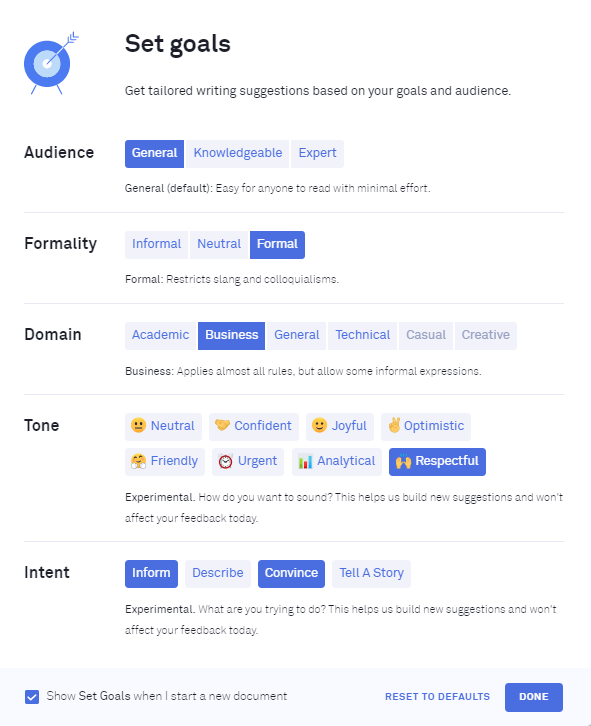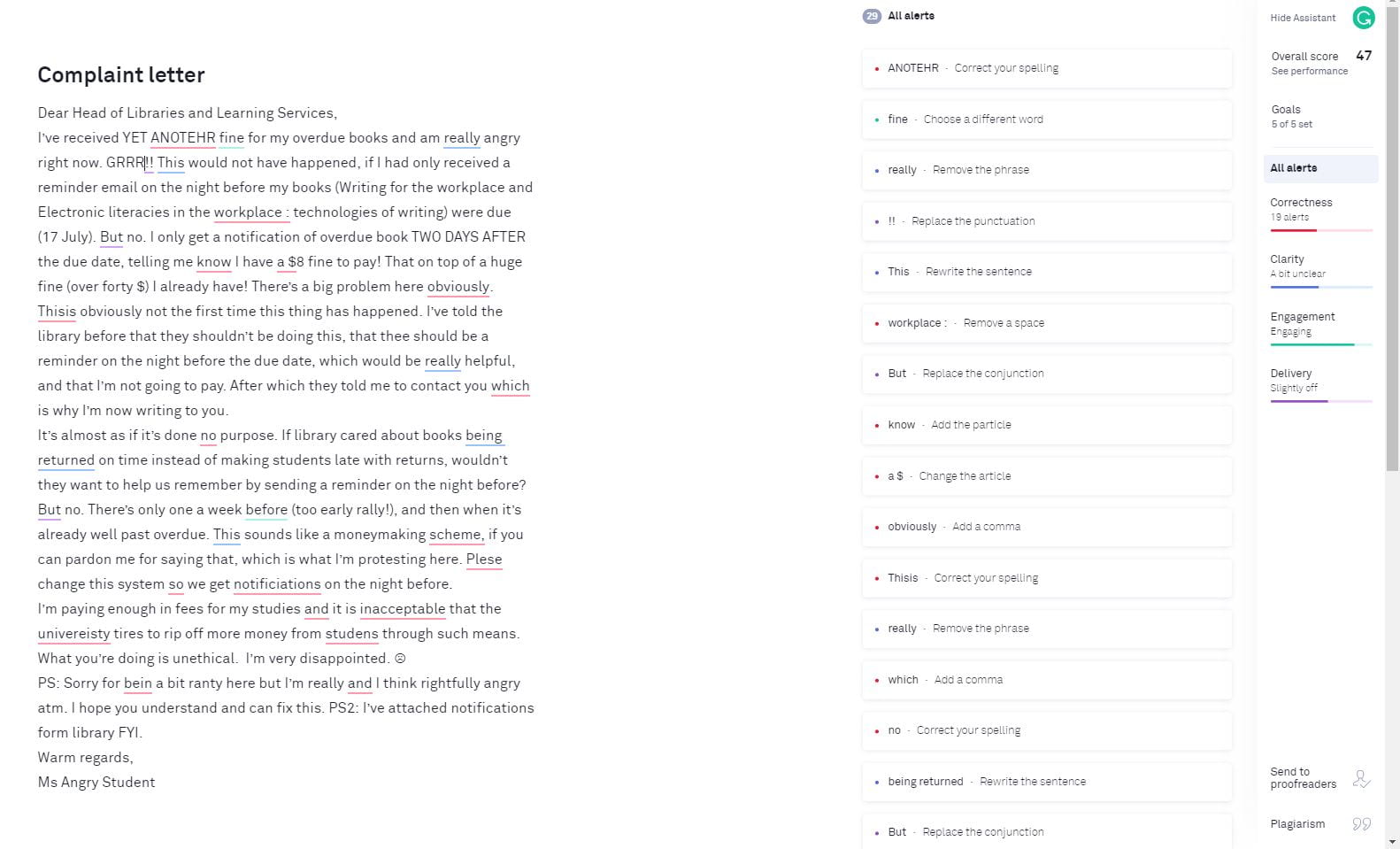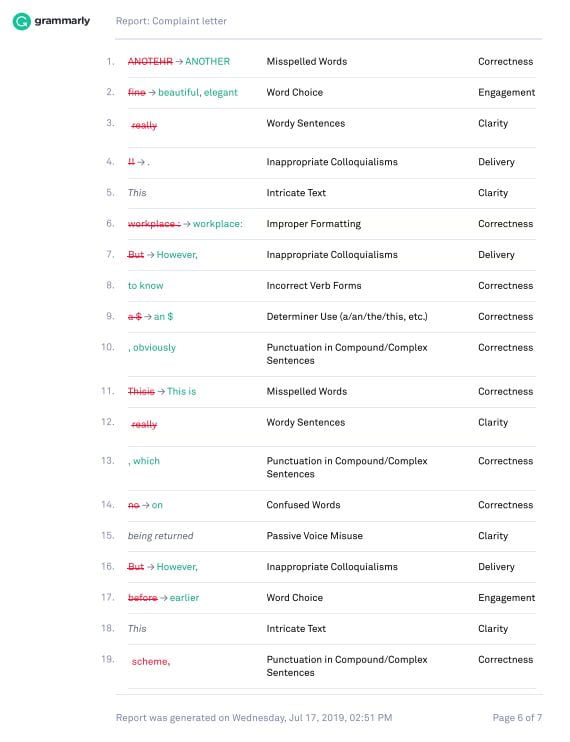Grammarly assesses a badly written formal complaint letter
We asked Grammarly’s Premium version to assess a mock complaint letter, written by an imaginary student to the management of the university’s library.
We set the following goals for the task:
And we got this result (click on the image to enlarge it):
Here is the full list of the corrections noted by Grammarly, as taken from its full report:
Grammarly picked up most spelling errors in the letter, except for the cases in which the misspelling of one word had resulted in another word (“rally” instead of “really,” “thee” instead of “there,” “know” instead of “now,” “tires” instead of “tries”). The tool cannot fully grasp the meaning of each sentence and it especially cannot grasp the larger context.
Aside from spelling, there were very few acceptable corrections/suggestions that Grammarly made:
![]() the adverb ‘really’ suggests informality and could indeed be avoided. In this text, it’s also overused
the adverb ‘really’ suggests informality and could indeed be avoided. In this text, it’s also overused
In fact, the tool mostly offered bizarre corrections, including false positives, and it missed other mistakes (so-called “false negatives”):
![]() while it corrected the misspelling of “another” in the second line, it had no objections to the use of ALL CAPS (the written equivalent of shouting in this context)
while it corrected the misspelling of “another” in the second line, it had no objections to the use of ALL CAPS (the written equivalent of shouting in this context)
![]() it mistook the noun “fine” for its adjective homograph (as in “fine weather”), and suggested a synonym (“beautiful,” “elegant”) as a stronger alternative
it mistook the noun “fine” for its adjective homograph (as in “fine weather”), and suggested a synonym (“beautiful,” “elegant”) as a stronger alternative
![]() while it flagged the use of double exclamation marks (in this context, even a single one should be seen as inappropriate), it ignored the onomatopoeic expression of anger in capital letters right before it (i.e. “GRRR”)
while it flagged the use of double exclamation marks (in this context, even a single one should be seen as inappropriate), it ignored the onomatopoeic expression of anger in capital letters right before it (i.e. “GRRR”)
![]() it suggested replacing “But,” in the short sentence fragment “But no,” with “However”
it suggested replacing “But,” in the short sentence fragment “But no,” with “However”
![]() it couldn’t figure out that the phrase “telling me know I have … a fine to pay” should read as “…now I have… a fine…”, so just advised the writer to turn the verb “know” into its infinitive form “to know”
it couldn’t figure out that the phrase “telling me know I have … a fine to pay” should read as “…now I have… a fine…”, so just advised the writer to turn the verb “know” into its infinitive form “to know”
![]() it failed to note the repetition of the emotionally-loaded adverb “obviously,” and merely suggested inserting a comma before the first instance
it failed to note the repetition of the emotionally-loaded adverb “obviously,” and merely suggested inserting a comma before the first instance
![]() it also missed the repetition of “which” within the same (incomplete) sentence (“After which they told me…”)
it also missed the repetition of “which” within the same (incomplete) sentence (“After which they told me…”)
![]() Grammarly’s only objection to the problematic sentence, “This sounds like a moneymaking scheme, if you can pardon me for saying that, which is what I’m protesting here” was the allegedly unnecessary comma after “scheme” (a false positive)
Grammarly’s only objection to the problematic sentence, “This sounds like a moneymaking scheme, if you can pardon me for saying that, which is what I’m protesting here” was the allegedly unnecessary comma after “scheme” (a false positive)
![]() it allowed the use of a smiley (“☹”)
it allowed the use of a smiley (“☹”)
![]() its only corrections for the sentence “Sorry for bein a bit ranty here but I’m really and I think rightfully angry atm” were to alter the spelling of “being” and add a missing comma after “and” (there should also be one after “think”). The tool ignored “atm,” the informal shorthand for “at the moment.”
its only corrections for the sentence “Sorry for bein a bit ranty here but I’m really and I think rightfully angry atm” were to alter the spelling of “being” and add a missing comma after “and” (there should also be one after “think”). The tool ignored “atm,” the informal shorthand for “at the moment.”
Lastly, Grammarly did not show any understanding of appropriate salutations and sign-offs in writing (note the post scripta that come before the signature).
Even if Grammarly could accurately correct all the grammatic and spelling mistakes made in this letter, it would nevertheless miss many other issues (such as the lack of clarity, problems with tone, and inappropriate informality).
Text used in the experiment: a sample complaint letter we created for a classroom activity, using an MSGC template for letters. Click here to download it in a .docx format.



